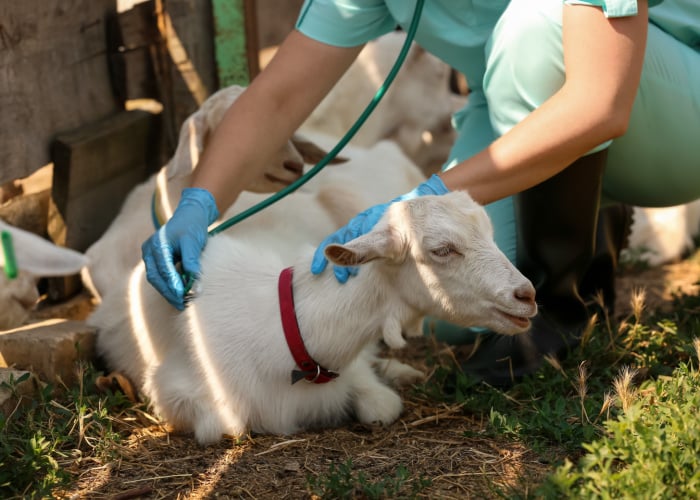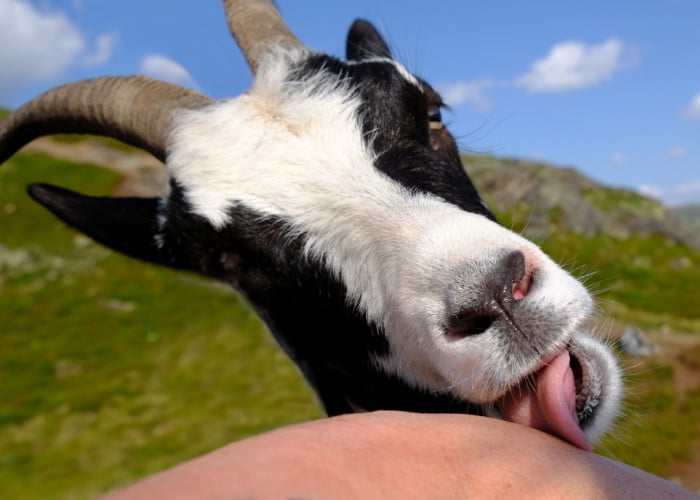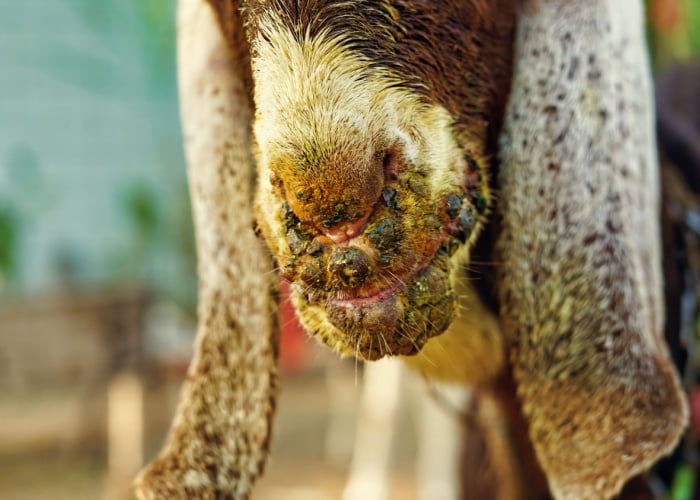Goat anemiais characterized by a decrease in goats’ red blood cell count or hemoglobin levels.
It is a serious health concern that can result in weakness, stunted growth, and even death if left untreated.
Understanding the causes, symptoms, and treatment of goat anemia is crucial for maintaining the health and well-being of your goats.
So in this article, we’re going to cover:
- what causes goat anemia
- the symptoms to look out for
- and how it can be treated
Let’s get started!
What is Goat Anemia?
Goat anemia refers to a condition in which goats have alower-than-normal number of red blood cells or reduced hemoglobin levelsin their blood.
Red blood cells and hemoglobin are responsible for carrying oxygen throughout the body.
Anemia can occur due to various factors, such as internal parasite infestation, nutritional deficiencies (e.g., iron, vitamin B12), or other underlying health issues.
Goat anemia can result in weakness, poor growth, decreased performance, and other health complications if left untreated.
Proper diagnosis and appropriate treatment are essential to address the underlying cause and restore the goat’s health.
We discuss each of these in greater detail below.
What Causes Goat Anemia?
There are several potential causes of anemia in goats.
And knowing which problem is the culprit helps you treat and then prevent anemia in your goats in the future.

Malnourishment and Deficiencies
This is probably not a surprise to you.
Inadequate levels ofessential nutrients, especially iron, copper, and certain vitamins (such as vitamin B12 and folic acid), contribute to anemia in goats.
Poor-quality forage, imbalanced diets, or underlying metabolic disorders can result in these deficiencies.
It’s not always obvious when your forage is missing one or more of these key nutrients, so testing your hay, pasture, and soil and also knowing the symptoms of deficiencies is so beneficial.
Parasites
Internal parasites, especiallyHaemonchus contortus(barber pole worm), can cause anemia in goats.
These parasites feed on the goat’s blood, leading to blood loss and anemia over time.
Barber pole worms are notorious for causing goat anemia, and here’s why:
- These internal parasitesattach to the lining of your goat’s fourth stomach compartmentand start to steal the host goat’s blood. This results in significant blood loss for your animal.
- The feeding activity of these terrible wormscauses damage to the abomasal tissue, leading to severe inflammation and ulcers. This damage can further contribute to blood loss and compromise the goat’s ability to absorb nutrients, exacerbating the anemia.
- Their presence in the abomasuminterferes with nutrient absorption. The worms compete with the goat for available nutrients, leading to decreased absorption of essential nutrients, including iron, which is necessary for red blood cell production.
- Your goat then experiencesreduced protein levels in their bloodstream, a condition known ashypoproteinemia. Since proteins are essential for various bodily functions, including the production of red blood cells, a decrease in protein levels contributes to anemia.
- Finally, the goat’s immune system responds to barber pole worms by mounting an immune response, includingincreased production of white blood cells. However, this response also consumes a considerable amount of energy and nutrients, diverting resources away from red blood cell production and potentially worsening the anemia.
If you think your goats have an unhealthy level of internal parasites,consider deworming your goats.
Heavy infestations of external parasites, such as lice or ticks, can also cause blood loss and anemia in goats, though this is not nearly as common of an issue.
The Symptoms of Goat Anemia
Detecting the signs of anemia in goats is crucial for early intervention.
Here are the signs and symptoms you should watch out for.
Pale Mucous Membranes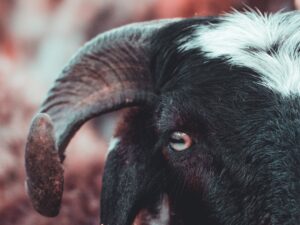
Check thegums, inner eyelids, and vulvain females for paleness.
Healthy goats have bright pink or red mucous membranes, whileanemic goats often exhibit whitish paleness.
You should really get in the habit of glancing at your goat’s inner eyelids and overall temperament every time you interact with them.
This is a great practice that will help you catch problems early on.
Weakness and Fatigue
Anemic goats may appear weak, lethargic, and easily fatigued.
They may exhibitdecreased appetite, reduced activity, and reluctance to move.
A goat who is really sufferingwill lie down and not want to stand back upor may be unable to do so.
Once you notice weakness or dullness in your goat’s personality, you must act fast to save them.
But honestly, it may already be too late.
Weak goats aren’t going to be interested in eating, which compounds all of the other issues they’re already facing.
Weight Loss and Poor Growth
Anemia can lead to weight loss and stunted growth in goats.
Affected animals may fail to thrive despite adequate nutrition.
Since anemia results in a diminished capacity to carry oxygen throughout the body, this impacts several key physiological processes, including metabolism.
Inadequate oxygen delivery can impair energy production and reduce appetite, resulting in weight loss.
Anemic goats may also experience decreased nutrient absorption in the gastrointestinal tract.
This can be due to changes in gut motility, altered enzyme activity, or compromised intestinal health associated with anemia.
The reduced absorption of nutrients, including proteins, carbohydrates, and fats, can contribute to poor nutrient utilization and subsequent weight loss.
Not only they’re not getting the calories and nutrients they need, but they’re also losing important muscle throughout their bodies.
And the loss of muscle is devastating for an already sick goat.
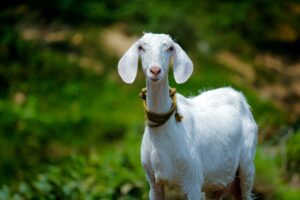
Rapid Breathing and Heart Rate
Anemia makes goats have faster heart rates with quick, distressed breathing.
This happens because oxygen delivery, oxygen transport methods, and tissue oxygenation are disrupted, and the body has to find different ways to keep the animal alive.
Anemia reduces the amount of oxygen reaching body tissues.
So in response, the respiratory system compensates by increasing the breathing rate.
The increased respiration aims to bring in more oxygen with each breath.
The heart also tries to compensate by increasing its pumping rate, resulting in a higher heart rate.
This heart rate helps transport the remaining oxygen more rapidly to the tissues, attempting to meet the body’s oxygen demands.
Lastly, anemic goats have a decreased ability to oxygenate their tissues adequately.
The rapid breathing and increased heart rate aim to maintain the oxygen supply to the tissues, even if the oxygen-carrying capacity of the blood is compromised.
These compensatory mechanisms help ensure vital organs and tissues receive sufficient oxygen for proper functioning.
How to Treat Anemia in Goats
The treatment for anemia in goats depends on the underlying cause.
It’s important to work closely with a veterinarian to determine the specific cause of anemia in your goats and develop an appropriate treatment plan.
Deworming
If anemia is caused by internal parasite infestation, deworming medications effective against the particular parasite species should be administered.
Parasitic worms are usually the reason why goats are anemic.
Deworming will not immediately remedy the problem, but it is a start in the right direction.
You may need to pair this with nutritional补充and iron injectibles if your goat is poorly.
Nutritional Supplements
Providing nutritional supplements can help address deficiencies and support red blood cell production.
This may include administering iron injections, vitamin B12 injections, or oral supplements based on the underlying deficiencies identified.
Work with your veterinarian or an experienced goat keeper to determine the appropriate dosage and duration for these supplements.
Management Practices
Good management practices can help prevent anemia and support recovery.
这包括保持适当的卫生设施,及其menting pasture rotation to minimize parasite exposure, and providing abalanced dietwith adequate essential nutrients.
If possible, test your pasture, soil, and hay (or other forage used) to get a good picture of the vitamins, minerals, and nutrients your goat is ingesting.
Testing these sources lets you find and correct these deficiencies before they become an issue for your herd.
Injectibles and Pills
You can use iron injectables and iron pills to help your goat out immediately.
Most of these solutions are designed and marketed for other species, like cattle, sheep, horses, and hogs, but it is okay for you to use them as “extra labels” or “off labels” for your goats.
Goats are often forgotten about regarding medication, but that’s okay when you learn how to do safe workarounds.
Iron-Dex 200 B12is a common option; it’s a vitamin-mineral restorative supplement that works fast.
Inject 1 to 2 mL through a deep intramuscular route.
Durvet Iron-100is another popular choice.
It absorbs quickly, so you’ll see results almost immediately.
Administer 1mL through an intramuscular injection.
Repeat this process in 10 days if needed. You can also use this as a preventative for anemia.
Iron pills are not really pills but instead pellets.
UltraCruz Goat Iron Chargeis a great option.
Give one scoop (the scoop is provided with packaging) to your iron-deficient goat daily for up to fourteen days.
Do not give this to your goats that are not anemic– it’s too much for them.
Veterinary Monitoring
Regular veterinary check-ups are important to monitor treatment progress and ensure that the anemia is being effectively managed.
你的兽医可以执行提单ood tests to assess the goat’s red blood cell count, hemoglobin levels, and overall health.
Blood Transfusion
In severe cases of anemia, a blood transfusion may be necessary to replenish the goat’s red blood cell count quickly.
Blood transfusions should be performed by a veterinarian and require a compatible blood donor source.
I share this option last because it is relatively unlikely you’ll have a veterinarian who is willing, capable, and available when you need this to happen.
Still, it’s worth looking into this option; you may get lucky!
FAQs about Goat Anemia
What Do You Give a Goat for Anemia?
Anemic goats need iron injectables or iron supplements to boost their red blood cell production immediately.
Vitamin B12 supplements are also recommended because this is usually affected by anemia as well.
What Are The Signs of Anemia in Goats?
Anemic goats will have pale inner eyelids, gums, and vulvas (for the does).
They will act weak, tired, and uninterested, lose weight, and lose their appetites.
It’s also common to see rapid breathing and a high heart rate due to low red blood cell counts.
What Is The Most Common Cause of Anemia in Goats?
Barberpole stomach worms, an internal parasite, is almost always the culprit for goat anemia.
They attach to the lining of the goat’s abomasum (the fourth stomach compartment) and feed on the host’s blood.
As they feed, they consume significant amounts of blood, leading to blood loss within the goat’s digestive tract.
Can Worms Make a Goat Anemic?
Worms will make your goat anemic, and this is often what causes goat anemia.
Parasites steal key nutrients and blood from their host, leading to weak and anemic goats.
Are you interested to learn more about goat health?
Check out these links below for a couple more interesting and informational reads!
